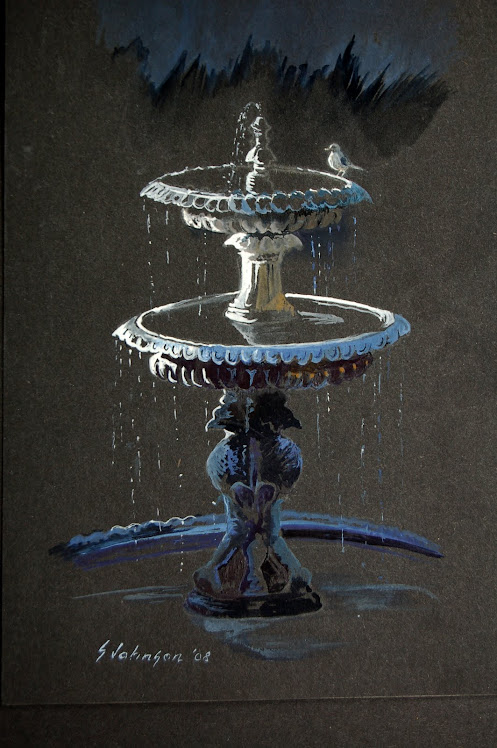He appeared at our kitchen door one rainy morning looking like, well, something the cat dragged in. He was soaking wet, had protruding ribs, and was missing a chunk from his left ear. He didn't meow, he chirped as if he'd been raised by grackles.
"Don't feed that cat," I said to Fred, "or he'll never leave." So, of course, Fred did--and the cat didn't.
He set up housekeeping under our back deck, never letting us pet him, but roaming the neighborhood at night and returning "home" each day to empty a bowl of kibbles. Bed and board greatly improved his appearance. His ear mended, his ribs disappeared, and his bright orange fur began to glisten in the sunlight. We named him Sammy Davis, Jr., our very own Golden Boy.
Sam was a happy cat--but lonesome. Over and over he tried to ingratiate himself with Callie, our pretty female cat, but she would only hiss and walk away.
We decided if he was going to fraternize with other neighborhood cats, we should have his health checked. But how? Street-wise and wily, he wouldn't let us get close enough to grab him. So we stopped filling the kibble bowl for a couple of days and caught him in a humane trap. Off to the vet he went.
Our instructions were to put him down if he was diseased, and to nip him in the bud and inoculate him if he was healthy. The news was good, and he came home the next day. Not much time passed before he began to accept an occasional scratch behind the ears, and he seemed to have lost interest in his nightly wandering.
Except once.
One afternoon we looked out the kitchen window and saw Sam with something in his mouth--a bird? a rat? Upon closer inspection we saw that it was a barely weaned kitten that he had carried home over the high board fence. Fred likes to think Sammy went out for one last peregrination and ran into an old girlfriend, who said, "I bore her, I weaned her, now you raise her."
Sam didn't mind that she was a really ugly kitten, who looked to me as if she'd been fashioned from leftover pieces of others people's cats. He loved her and cuddled her and licked her face and ears. We named her "Pie" because of her coat of many colors.
Sam took to fatherhood like an old pro. When Pie needed to suckle, he would lie on his back and indulge her to whatever extent he could. So that she could defend herself, he taught her to play/fight, letting her sneak up behind him to pounce, then roll over helplessly as if she'd gotten the best of him.
When Sam's kitten died of cancer at age five, we were afraid we would lose him, too, so bonded were the two. But Sam was stoic. After two days of investigating every closet and cranny, he went on about his business and continued his attempt to court Callie.
It took him fourteen years, but he finally won her over. On warm, sunny days we would find them sleeping beside each other out on the deck. On a wintry day they would snuggle together in the wicker basket in front of the fire. And of course all four of us shared our bed.
Last Christmas, Callie died at age sixteen, and shortly thereafter Sam began to lose weight and have other health complications. Trips to the vet became more and more frequent. Yet Sam handled it with the same stoicism he had always shown, never once in seventeen years using a claw or a tooth inn protest. There are cats, and then there are great cats. Sam was one of the greatest.
We did our best to medicate him and to encourage him to eat, yet once an eleven pounder, he now weighed five. "When his quality of life is nil, we'll know it's time," we said to each other. And that time turned out to be this morning--June 18, 2011.
Our thoughtful vet put us in a room by ourselves and let me hold my golden boy until he left the world.
.
[Scroll down for additional posts]







